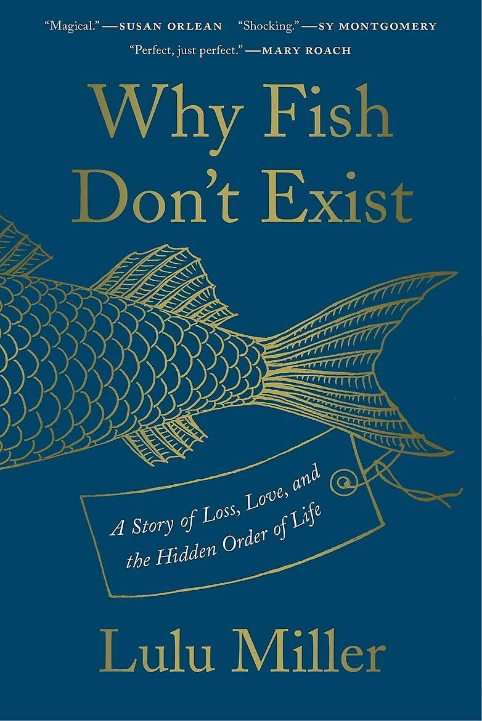I wandered across this book in the staff recommended section of Barnes and Noble. Perhaps I could have found it recommended in an online book review or “best of” list, but the whimsey of a chance bookstore discovery is why we love to browse.

“Picture the person you love the most. Picture them sitting on the couch eating cereal, ranting about something (trivial and) totally charming. Chaos will get them. Chaos will crack them from the outside – with a falling branch, a speeding car, a bullet – or unravel them from the inside, with the mutiny of their very own cells. Chaos will rot your plants and kill your dog and rust your bike. It will decay your most precious memories, topple your favorite cities, wreck any sanctuary you ever build. It’s not if, it’s when. Chaos is the only sure thing in this world. The master that rules us all. ….there is no escaping the Second Law of Thermodynamics; entropy is only growing; it can never be diminished, no matter what we do. A smart human accepts this truth. A smart human does not try to fight it. But one spring day in 1906, a Tall American man with a walrus mustache dared to challenge our master. His name was David Starr Jordan…”
The book was written by Lulu Miller, who is an award-winning science reporter for National Public Radio. In 2020, she published Why Fish Don’t Exist, a personal memoir incorporating the life and work of David Starr Jordan (January 19, 1851 – September 19, 1931). He was the founding president of Stanford University, serving from 1891 to 1913. Prior to serving as president of Stanford University, he had served as president of Indiana University from 1884 to 1891. https://en.wikipedia.org/wiki/David_Starr_Jordan
The life of David Starr Jordan is by many accounts an American success story. He learned to appreciate the study of nature from his early life on a farm in upstate New York. He was ambitious and hardworking and determined in his approach to scientific research and became an acclaimed ichthyologist (a zoologist who identifies and classifies different fish species) during his career in research.
He overcame setbacks including the twice destruction of his scientific specimens (respectively by fire and earthquake), the early death of his first wife and continuing academic competition to rise to the level of university leader and respected “philosopher, scientist, …explorer, crusader for peace, and an advisor to Presidents and foreign statesman. “By nature, he was an eternal optimist who also had a personality trait of self-delusion. Self-delusion can help people to maintain a positive self-image and feel good about themselves. For example, people may overestimate their own abilities or intelligence, or they may downplay their own flaws and weaknesses. In his professional life he was an attractive leader and example to many, yet also vindictive, in the actions he took to progress his career and reputation.
The title of the book refers to the fact that fish as a category of animals do not truly exist, as confirmed by 20th century research zoologists. “And in the end his beloved fish did not truly exist as a distinct class of animals.”
Starr’s studied under and learned to accept flawed theories of human nature from Louis Agassiz, a nineteenth century biologist and geologist who is recognized as a scholar of Earth’s natural history. These “beliefs” led to his unwavering advocacy and support for the concept of Eugenics*. His published views expressed a fear of “race-degeneration” and asserted that the broader animal kingdom and human beings are “governed by the same laws of selection”. He was an antimilitarist since he believed that war killed off the best members of the gene pool, and he initially opposed American involvement in World War I.*
It is (to me) a rare combination of an historical biography and a personal memoir. As a memoir, the author intersperses this historical story with sections on her own personal development, through childhood family interactions with her father who appreciated the chaos and futility of life (you don’t matter…live as you please) “when other people don’t matter, either, treat them like they do”, her relationships, and her view of the world. I was impressed with her doggedness and persistence to research and tease out a complete view of a man whose writings and research papers were prodigious.
Book quote: “There is a grandeur in this view…” The quote comes from the last sentence of On the Origin of Species. It is Darwin’s sweet nothing, his apology for deflowering the world of its God, his promise that there is grandeur – if you look hard enough, you will find it”. If I find a book that teaches me about an important historical figure, and how to view the world, then I have discovered a small treasure. This is one I recommend.
* Eugenics: the study of how to arrange reproduction within a human population to increase the occurrence of heritable characteristics regarded as desirable. Developed largely by Sir Francis Galton as a method of improving the human race, eugenics was increasingly discredited as unscientific and racially biased during the 20th century, especially after the adoption of its doctrines by the Nazis in order to justify their treatment of Jews, disabled people, and other minority groups.